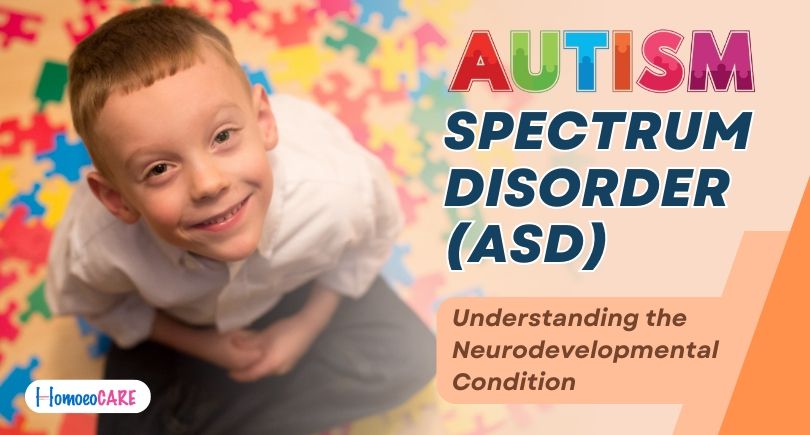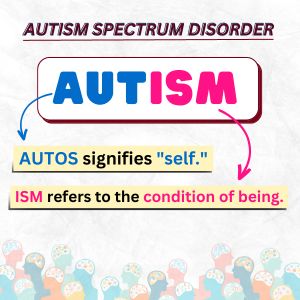
Autism Spectrum Disorder (ASD) is a neurodevelopmental disorder that profoundly impacts an individual's communication abilities, social interactions, and perception of the world. This condition exists on a spectrum, with varying manifestations and degrees of severity.
Let's break down the term "autism" into its two constituent parts: AUTOS and ISM.

Hence, in simple words autism can be defined as a state where a child withdraws from social and emotional interactions, focusing predominantly on themselves and their world.
The term "spectrum" in Autism Spectrum Disorder (ASD) represents a wide range of symptoms, behaviors, and severity levels that individuals with autism may experience. It encompasses diverse positions, opinions, and characteristics, much like the vibrant colors of a rainbow.
Each person with autism is unique, experiencing the condition in a distinct way and to varying degrees. The spectrum encompasses a broad range of symptoms, from mild to severe. While some children with autism exhibit exceptional abilities in specific areas like mathematics, art, or music, others struggle with fundamental social interaction and communication skills. It is crucial to acknowledge and provide support for the diverse needs of individuals on the autism spectrum, fostering understanding and acceptance.
The term "neurodevelopmental disorder" refers to a condition that affects the development of nerves or neurons within the body. In the case of autism, the communication between neurons, known as synapses, is affected.
The prevalence of autism has been increasing in recent years. Current estimates suggest that it affects approximately 1 in every 54 children in the United States. India, too, grapples with this issue, with a prevalence rate of around 1 in 500 and an annual growth of 10-15%. Unfortunately, many children with autism, especially in India, remain undiagnosed, lacking the essential support and resources they need.
Autism affects individuals from diverse ethnic, racial, and socioeconomic backgrounds, with a higher prevalence in boys compared to girls, roughly four times higher. However, the actual numbers could be even higher, as many individuals with autism in India and other countries remain undiagnosed. Limited awareness about the condition among professionals and prevailing misconceptions pose significant challenges for those affected, hindering their access to necessary support.
Recognizing autism can be a complex task, further compounded by the lack of sufficient knowledge and understanding of the condition among professionals. This often leads to misdiagnosis or underdiagnosis, depriving children with autism of the crucial support they require. Additionally, a substantial number of individuals with autism in India remain undiagnosed, emphasizing the urgent need for greater awareness and understanding of the condition.
There are several factors contributing to the underdiagnosis or Misdiagnosis of autism:
Lack of Awareness: Many parents and family members fail to recognize the early signs of autism, dismissing them as normal variations in child development. For instance, if a child does not babble or coo by six months of age, it may indicate early signs of autism. However, such signs are sometimes overlooked, and parents may attribute them to a speech delay, neglecting to seek a medical evaluation.
Stigma and Cultural Factors: In certain cultures, there remains a stigma associated with autism, which can discourage parents from seeking medical help. The fear of being judged or ostracized by their communities often prevents parents from getting their children diagnosed and receiving appropriate treatment.
The Complexity of Diagnosis: Some doctors may hesitate to diagnose autism due to its complexity and limited training in identifying and treating it. This reluctance can lead to delays in diagnosis and subsequent treatment, significantly impacting a child's development and long-term outcomes.
To address the challenges surrounding autism diagnosis and support, it is crucial to enhance awareness and understanding among professionals and the broader community. By promoting early intervention and providing resources for children with autism, we can empower them to reach their full potential and lead fulfilling lives. Every individual with autism deserves the necessary support and a society that embraces their unique abilities and contributions.
Conclusion
In conclusion, Autism Spectrum Disorder (ASD) is a complex neurodevelopmental condition that necessitates the expertise of dedicated professionals. As autism doctors and specialists, we recognize the importance of raising awareness and understanding about this condition. By promoting early intervention and providing support tailored to the individual needs of each person with autism, we can ensure they receive the best care possible. With the guidance of a skilled homeopathic doctor in autism, individuals on the spectrum can thrive and lead fulfilling lives.
Copyright ©2021 Homoeocare